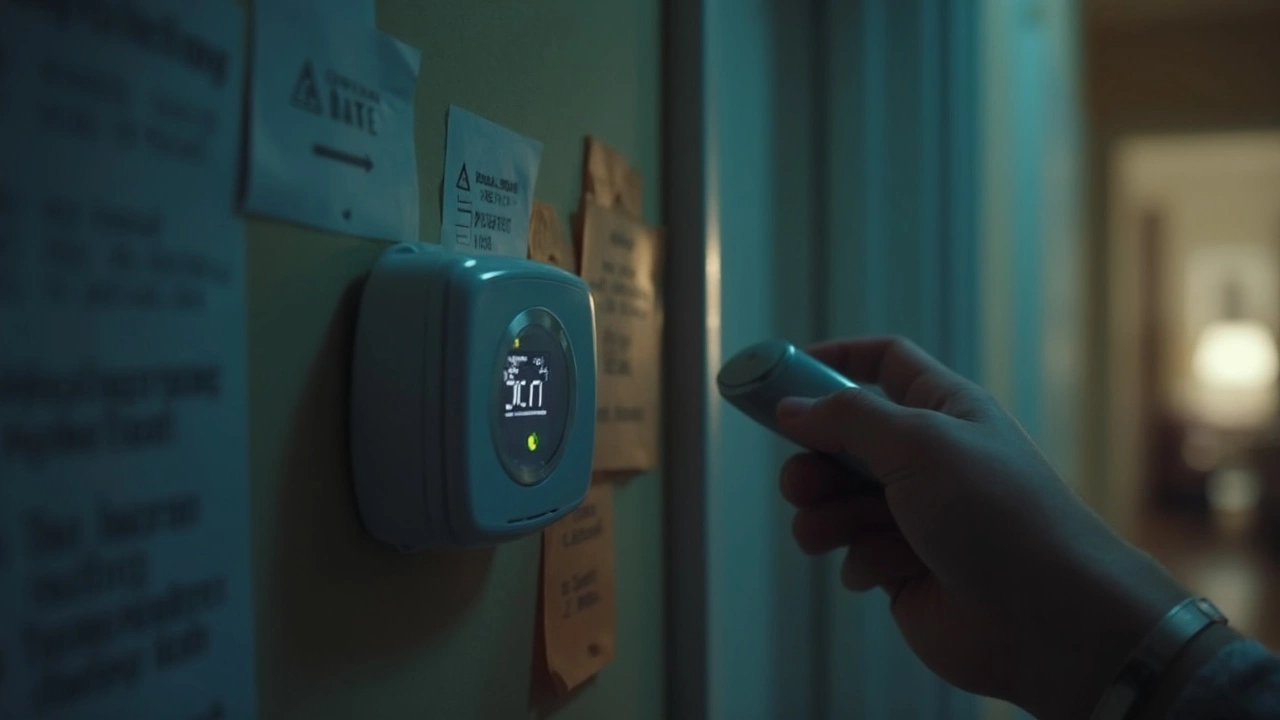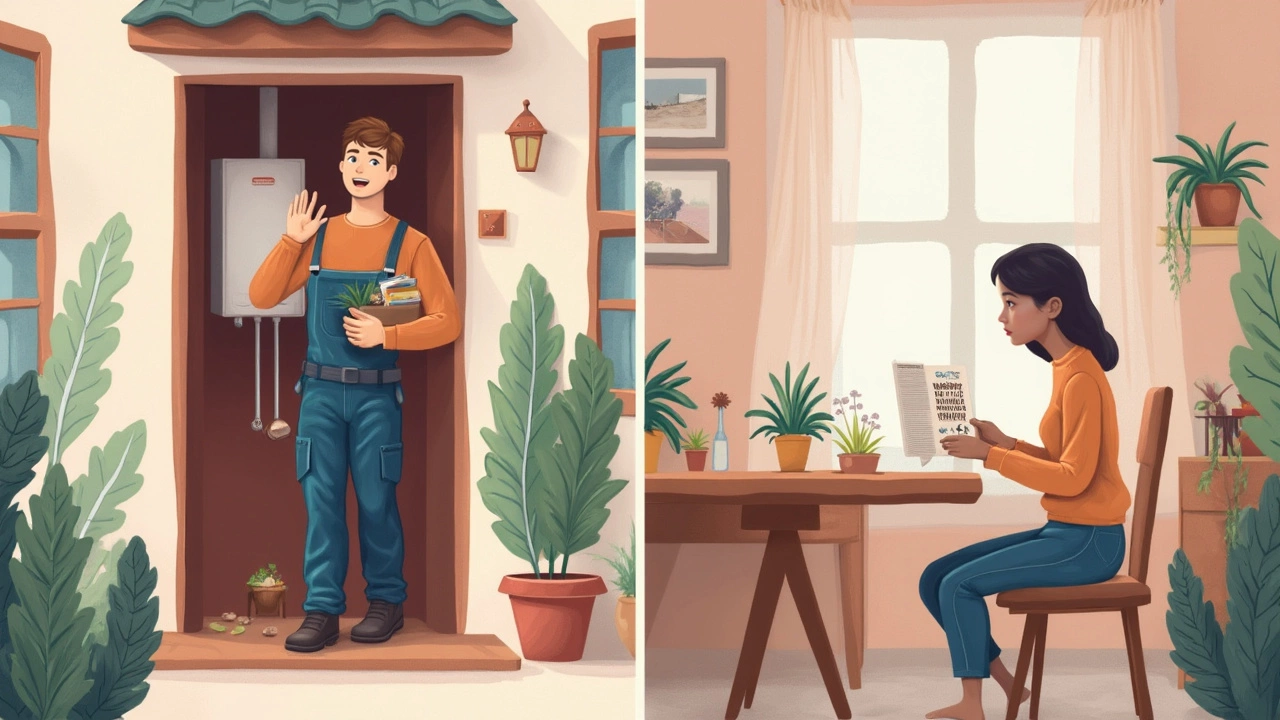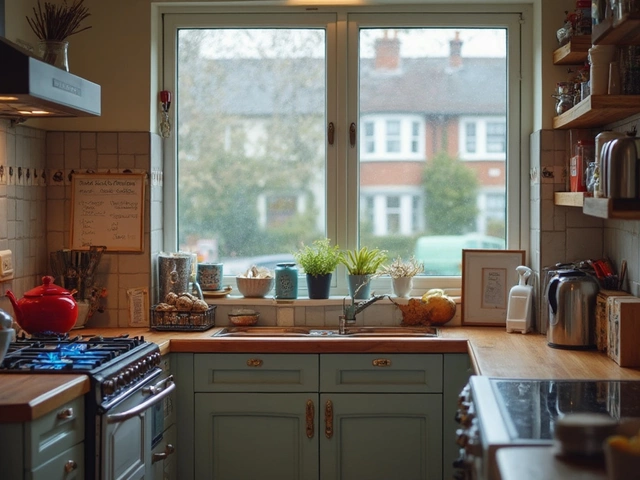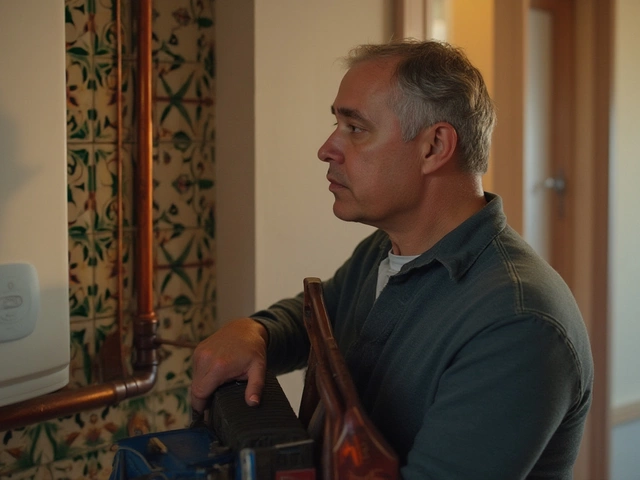Sitting at home in a freezing house with no hot water? Boiler problems never pick a good time to happen. If your boiler suddenly gives up, you’re probably wondering if this is a full-blown emergency or just a huge pain in the neck.
There’s actually a big difference between a boiler that’s just acting up and one that’s a straight-up emergency. For example, if you smell gas, notice water leaking, or see any warning lights flashing that you've never seen before, you shouldn’t mess around. These are emergency situations, and it’s key to act fast.
On the other hand, if your heating is patchy or there’s just no hot water but you’re not seeing or smelling anything weird, it might not be urgent—still annoying, just not dangerous. There are simple things you can check right away: make sure your thermostat’s up, check your pressure gauge, and see if the pilot light is on. Sometimes, it’s something fixable before the repair guy even shows up.
- When a Broken Boiler Is an Emergency
- Common Boiler Problems and What They Mean
- What to Do Before Calling for Emergency Repairs
- Staying Safe in a Boiler Breakdown
- How to Avoid Boiler Emergencies in the Future
When a Broken Boiler Is an Emergency
Not every cold shower is an emergency, but some boiler problems really can’t wait. Here’s how you know it’s time to drop what you’re doing and treat your broken boiler like a full-on crisis.
If you smell gas around your boiler, turn it off right away and leave the house. Gas leaks aren’t just scary—they’re seriously dangerous. The NHS warns, “Exposure to carbon monoxide can kill in minutes.” That’s not a scare tactic. Boiler gas leaks can seriously harm or even kill you, so treat any strange smell as a 999 (emergency services) situation.
Cassie Brooks, a heating safety specialist, says, "Anytime you suspect a gas leak or can see water leaking directly from the boiler casing, do not try to fix it yourself. These are emergencies that need a pro immediately."
Here are the clear signs a boiler breakdown is an emergency and needs professional help ASAP:
- You smell gas, or there’s a strong burning smell around the boiler
- Visible leaks of water or fuel from the boiler
- Loud banging, hissing, or clunking noises (way more than the usual hums and clicks)
- Your carbon monoxide alarm is sounding
- The boiler is completely dead and won’t turn on, especially in freezing weather or if there are babies, seniors, or sick people in the home
You probably won’t be the first person calling for emergency help. British Gas reports nearly 150,000 emergency boiler breakdown callouts each winter. Here’s how the most common boiler emergencies break down:
| Emergency Type | Response Needed |
|---|---|
| Gas Leak | Leave house, call emergency services |
| Water Leak | Switch off boiler, call a qualified engineer |
| No Heat in Winter | Call repair if vulnerable people are at home |
| Carbon Monoxide Alarm | Turn off boiler, leave, call emergency number |
If you run into any of these problems, don’t try to fix it yourself. Not only is it dangerous, but DIY jobs can mess up your warranty or even break the law when it comes to gas. Always call a registered Gas Safe engineer for emergencies.
Common Boiler Problems and What They Mean
If you’ve ever woken up to a cold house or hopped in for a shower only to find icy water, you know boilers can act up without warning. The tricky part? Figuring out what the symptoms actually mean. Here are some of the most common boiler faults, what might be causing them, and how serious they actually are.
- Boiler won’t turn on: This can sound dramatic, but it’s not always the end of the world. Check the fuse box and ensure power is getting through. If the display is blank, it could be an electrical issue or a blown fuse.
- No hot water or heating: Before you panic, check the pressure gauge. Most boilers need to be between 1 and 2 on the dial. If it’s too low, topping it up can sometimes fix it on the spot.
- Strange banging or gurgling noises: Known as ‘kettling,’ this noise often means there’s limescale or sludge built up in the system. It's common in hard water areas. If left alone, this can mess up your heat exchanger and seriously shorten your boiler’s life.
- Water leaking from the boiler: Tiny leaks under a boiler might mean a loose connection. Big leaks, or water coming from the pressure valve, are serious and often need a pro.
- Radiators not heating up properly: Sometimes this has nothing to do with the boiler and everything to do with needing to bleed your radiators. If all radiators stay cold, the issue could be with the pump or the programmer inside the boiler.
- Pilot light keeps going out: Older boilers have a pilot light, and if it keeps snuffing out, it could be a sign of a faulty thermocouple or sometimes just a draught blowing through.
- Boiler pressure too high: This is less common, but if you see the needle way above the normal zone, don’t ignore it. High pressure can break seals, leading to leaks and even damaged parts.
Here’s a quick table showing common boiler problems, what they might mean, and when to call someone in:
| Problem | Possible Cause | Urgency |
|---|---|---|
| Boiler not turning on | Power issue, fuse blown, thermostat fault | If persistent, call engineer |
| No hot water/heating | Low pressure, airlock, thermostat problem | Check yourself, call if unresolved |
| Banging noises | Limescale, air in system | Book a service soon |
| Water leak | Broken seal, high pressure, faulty valve | Call engineer immediately |
| Cold radiators | Needs bleeding, sludge, faulty pump | Bleed yourself, call if still cold |
| Pilot light out | Thermocouple, draught, gas problem | Relight if safe, call if it won’t stay on |
| High pressure | Overfilled, faulty pressure valve | Release pressure, call if unsure |
If you spot any signs of gas, strong burning smells, or smoke stains, treat them as an emergency and call a professional right away. Stuff like low pressure or occasional noises can usually wait, but leaks, constant banging, or anything electrical should never be brushed off.

What to Do Before Calling for Emergency Repairs
Before you grab the phone and start panicking about broken boiler disaster costs, it’s worth running through a few things. Sometimes the fix is easier than you think, and you can save time and money if you check some basic stuff yourself.
Here’s what you should quickly try if your boiler isn't working right:
- Check the thermostat settings: Make sure it’s not set too low or switched off by accident. A mis-set thermostat is an easy fix that trips up a lot of people, especially after a power cut.
- Look at the boiler pressure: Most home boilers need the pressure between 1 and 2 bars. If it’s too low, there’s usually a simple refill valve at the bottom. If it’s too high, that’s a red flag—don’t try to drain it yourself, call a pro.
- Inspect for power issues: Check if other appliances on the same circuit aren’t working. If nothing else works either, it could be an electrical fault, not the boiler itself.
- Reset the boiler: Look for a reset button—your manual will point it out—and follow the instructions. If your boiler comes back to life, you’re probably good. If it keeps cutting out, don’t keep resetting—it could make things worse.
- Look for obvious leaks or error codes: If you spot water around the base or notice any error code displayed on the boiler screen, look up the code in your manual. Some are simple warnings, while others mean you need help right away.
If you try all this and still have no heat or hot water, it might be time to call in the experts, especially if your boiler is old or has been making weird noises lately!
Want to know how common easy-fix boiler problems are? Check this out:
| Problem | Chance It’s DIY Fixable | Common Cause |
|---|---|---|
| Low Pressure | 60% | Lost water in system, bled radiators |
| Pilot Light Out | 55% | Draft, power cut, sensor issue |
| No Power | 40% | Tripped breaker or fuse |
| Thermostat Error | 65% | Settings changed, batteries dead |
If you’re ever in doubt or you notice any signs of gas, burning smells, or smoke—don’t hang around. Leave the house and get emergency help straight away. Otherwise, a bit of troubleshooting could save you a repair bill.
Staying Safe in a Boiler Breakdown
Safety comes first anytime something’s wrong with your boiler. Some problems can be flat-out dangerous, so knowing what to do makes a massive difference. Carbon monoxide leaks, gas smells, or sudden leaks can turn a bad day into a disaster if you don’t handle things right.
If you notice a strong gas smell around your boiler or in the house, leave immediately and call the National Gas Emergency number (0800 111 999 in the UK, or your local equivalent). Don’t mess with switches, and don’t use your phone inside the house. Gas leaks are no joke—better safe than sorry.
Got a carbon monoxide alarm? Pay attention to it. This gas is deadly and has no smell or color. If your detector goes off, fresh air is your friend—get everyone out quickly. Call for emergency help and don’t go back inside until the all-clear.
- Check if your boiler's pressure gauge is way below 1 or above 2.5. Low or high pressure can mean damage or a leak.
- If you see water pooling under the boiler, turn it off at the mains. Water and electrics don’t mix, so play it safe.
- Never try to repair a gas or electric boiler yourself, unless you’re properly trained. DIY here is almost always a bad idea.
- If it's cold and you’re left without heating, wear layers, use extra blankets, and if it’s safe, plug in an electric heater. Make sure your space is still ventilated, especially if you’re using alternative heating.
Here’s a quick guide to what counts as a real emergency with your broken boiler:
| Situation | What to Do |
|---|---|
| Gas smell or hissing sound | Exit and call the gas emergency line asap |
| Carbon monoxide alarm going off | Get outside, call for help, don’t re-enter |
| Water leaking from boiler | Turn off water and power, call a professional |
| Strange noises (banging, whistling) | Turn off the boiler, wait for assessment |
| No heating or hot water in freezing temps | Use alternative heating safely, call for urgent support |
It pays to be alert. Hundreds of hospital admissions every year come from boiler-related incidents in the UK alone. Most of these are preventable. Your main job is to keep yourself and your family safe. If you’re ever on the fence, treat the situation like it’s serious until a pro says otherwise.

How to Avoid Boiler Emergencies in the Future
Let’s be real—getting stuck with a broken boiler is nobody’s idea of fun. The good news? You can sidestep most emergencies with solid habits and a bit of forward thinking. Here’s what works (and what folks often forget):
- Annual Servicing: Get your boiler checked once a year by a certified professional. Most breakdowns happen because small problems pile up until something big breaks. Regular checks catch these early.
- Check Your Boiler’s Pressure: Most modern boilers work best at around 1 to 1.5 bar. If the pressure’s always dropping or way too high, it could mean there’s a leak (or even a dodgy gauge).
- Bleed Your Radiators: Cold spots? Strange noises? It might just be air trapped inside the radiators. Bleeding them isn’t tough, and it helps the boiler not work overtime for nothing.
- Watch for Warning Signs: Don’t ignore weird noises—like banging, whistling, or gurgling. These usually mean something’s up, and getting advice early can prevent the need for emergency boiler repair.
- Don’t Store Junk Around the Boiler: Boilers need airflow. Piling up boxes, clothes, or anything else around them can lead to overheating or even safety shutdowns.
It also pays off to know how old your boiler is. Most have a lifespan of about 10 to 15 years. If yours is nearly ancient, you’re at higher risk for breakdowns. Here’s a quick look at how annual servicing matters, based on data from consumer boiler breakdown studies:
| Service Frequency | Annual Breakdown Rate |
|---|---|
| Annually serviced | 1 in 10 |
| Serviced less than once every two years | 1 in 5 |
| Never serviced | 1 in 3 |
Fit a carbon monoxide alarm if you haven’t already. It’s cheap, easy to set up, and could actually save your life if a fault causes a leak.
Bottom line: A bit of attention goes a long way. Stay on top of these basics, and boiler emergencies become way less likely.





